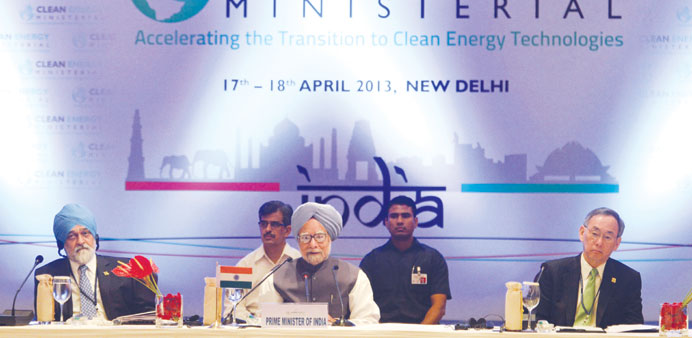Agencies/New Delhi
Prime Minister Manmohan Singh urged global companies yesterday to make the sun-baked nation a solar energy hub as the country seeks to cut its chronic power shortages.
India, which has an average of 300 sunny days a year, sees solar power as a potentially vital energy source that could be key to boosting power supplies and reducing greenhouse gas emission in the world’s third-worst carbon polluter.
“India is potentially a large market for production of such (solar) equipment and it is also a potentially competitive, attractive production base for supplying other countries,” Singh told a global energy conference.
“We therefore strongly encourage global manufacturers to set up production facilities in this area,” Singh said at the Fourth Clean Energy Ministerial meeting in New Delhi attended by representatives of over 20 nations.
India is working urgently to develop alternative power sources and wean itself away from polluting coal-fired generation to power an economy that is expected to grow by at least 6% this financial year.
It has just 551 megawatts of solar capacity installed currently, according to government figures, and some 70% of the equipment comes from abroad.
India’s National Solar Mission launched in 2010 aims to generate 20 gigawatts of solar power by 2022 - equivalent to one-eighth of the nation’s current installed power base.
The solar energy drive is also part of efforts to tackle frequent power outages especially in rural India that economists say knock an average 1.2 percentage points off annual growth.
But barriers to widespread introduction of solar power remain such as lack of technology and subsidies to consumers. Once installed, however, experts say the costs are low and are mainly confined to maintenance.
The Indian government has unveiled draft legislation that would allow the solar industry to obtain grants covering up to 40% of installation costs.
The prime minister also expressed concern over the slow progress of climate change negotiations, and said the goal of stabilising global temperatures at acceptable levels is nowhere in sight.
Singh said countries should take action to promote clean energy, and added India recognises the importance of evolving a low carbon strategy for inclusive and sustainable growth and will double renewable energy capacity by 2017.
“On any principle of equity, the industrialised countries have to bear a large share of the burden. They are historically responsible for the bulk of the accumulated greenhouse gas emissions and this alone suggests a greater responsibility,” he said.

Fourth Clean Energy Ministerial meeting in New Delhi.
